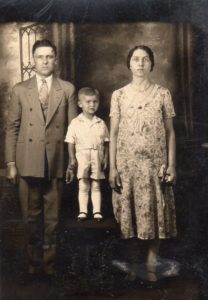Born On the Fourth of July

I love the Fourth of July. As a kid, it was always all about the fun, the games, the cook-outs, the swimming pool, and the fireworks. It wasn’t until I was an adult that I realized the Fourth of July was more than just a holiday. It is a way of life, and something to be celebrated every day of the year, not just on July 4th. I want to tell you a story about why I love the 4th of July. And the story begins with a little boy.
The little boy was born on a small farm in Czechoslovakia in 1927. One year later, he and his parents left their farm and traveled across the Atlantic to begin a new life in a small steel town in Western Pennsylvania and pursue the American Dream. That dream turned into a nightmare one year later when the little boy pulled a pot of scalding chicken soup over him, severely burning himself over 90% of his body.
He spent the next six months in the hospital, with his mother constantly by his side. His father worked in the steel mill, taking on as many extra shifts as he could handle in order to pay the mounting doctor and hospital bills. Every day, when his shift ended, the father walked 12 miles to the hospital to visit his wife and son. His wife would cry and complain because she didn’t understand what the doctors and nurses were trying to tell her, nor could she ask any questions. She spoke no English, and no one on the medical staff spoke Slovak.
The father did his best to comfort his wife before starting the long, lonely 12 mile walk home, crying hopelessly the entire way, overwhelmed with the burden of grief, guilt, concern over the mounting medical bills, and the horrible reality that his son might not survive. Every night, when he crossed the bridge over the Ohio River, he would stop and stare into the dark, murky water. And every night, he considered throwing himself off of the bridge and ending it all.
It was the thought of what would happen to his wife and son if he killed himself that stopped him. How would they survive? Besides, what kind of a man would abandon his wife and son in such a cold and brutal way? He was taught that a real man took care of his family. And every night, he would tear himself away from the railing of that bridge, not even bothering to wipe the tears that streamed down his face as he made his way home to the dark, cramped apartment which seemed so empty without his family. This was his daily routine for six interminable months.
Against all odds, the boy survived. But the doctors warned the parents that the boy still needed a lot of care to continue to heal, as well as a clean environment, instead of the dirty, sooty, smokey environment of the steel mills. (By this time the parents were still unable to understand English, but had found an interpreter to help them). The doctors recommended that the family return to Europe where the boy could recover in the clean, fresh air on the farm as well as have family support.
The boy’s parents finally decided that the woman and the boy would go back, but the man would remain in America. He would continue to work, taking on extra shifts and additional odd jobs to start paying off the exorbitant medical bills and send money back to support his wife and son. In the meantime, he would pay his living expenses and try to save money to send for them when his son recovered. The father bought passage to send his family back to Europe. As he and his wife kissed goodbye, they assured each other it would only be for a short time. It took ten years.
The boy and his mother lived a good life on the farm, and the boy continued to thrive and eventually made a complete recovery from his injuries. He loved the farm, his grandparents, his cousins, and his village. He and his two best friends spent hours exploring the forests surrounding their village as well as fishing in the canals in the summer and ice skating on the lake in the winter. There was always plenty of food, and he and his mother had a very close relationship.
However, times were changing and getting extremely dangerous, especially after Germany annexed Sudetenland in 1938. When Hitler invaded Prague, it was time to get out while they still could. The boy and his mother managed to leave Czechoslovakia in late December, 1939 to be reunited with his father. The reunion was a rocky one for the boy. After spending his entire life on the farm, it was a shock to be in a highly industrialized area, be surrounded by strangers, unable to speak the language, and to live in a cramped apartment with a strange man that he didn’t really like very much but who his mother seemed to adore.
To make the situation even worse, when he started school in January of 1940, he was put in the first grade class because he didn’t speak English. There he was, a 12 year old boy who was tall for his age surrounded by a bunch of first graders. It was humiliating. The other kids made fun of him, calling him “stupid” and laughed at his clothes, which were so different from their own. The boy tried to ignore them, even though he wanted to beat the crap out of them. However, instead of using his fists, he used his head.
He took English lessons in the evenings and on weekends, and he learned very quickly. One day, when he went to school, he “accidentally” walked into the wrong classroom, the one with the kids his own age. And size. The teacher was going to send him back until she made an interesting discovery. The boy was bright. Very, very bright. She kept him in her class.
The boy thrived. Oh, he had a few mishaps along the way, including a spectacular bike wreck that almost killed him. And then there was that incident when he stole a carving knife from the kitchen to use on one of his father’s friends at a bar. But, I’ll save those stories for another day. At the age of 17, just 5 years after immigrating to America, the boy left high school to join the Navy. The boy was now a man, and he served his country proudly, and with honor.
When the man returned home, he completed high school and went to night school to better himself. He learned welding, masonry, and other useful skills while he also made time to hunt in the woods and fish in the river and lakes. He became a highly skilled welder, stonemason, and master builder. He eventually met the love of his life, got married, and built his wife a beautiful stone house to raise a family in. He raised five girls, built them a community swimming pool to grow up in, taught them how to swim, ski, become good citizens, and sent them to college. He became a pillar of his church and his community, volunteering his skills as a builder and a leader at every opportunity.
When the man turned 40, he returned to his beloved Navy and joined the US Navy Reserves as a Seabee, much to his wife’s chagrin. His wife felt it would take too much time away from the family. But the man wanted to serve his country again, and to repay her for the wonderful opportunities she had given him. The man served for 25 years, retiring only because it was mandatory at age 65. When he died in November of 2010, just 19 days after losing his wife, his daughters buried him in his dress blues, because he loved his Navy and his country so much.
The man had a life well lived in a country he loved. And it could have been a much different story if he and his mother had not managed to escape Czechoslovakia on that cold December night, leaving on the last ship out of Calais before the start of the war.
That boy was my father. And that is why I celebrate the Fourth of July. That’s why I get choked up when I hear the Star Spangled Banner and God Bless America. And I always will. It’s a lesson I learned from that little boy, the one that became my dad.

American, Czechoslovakia, Eastern Europe, Fourth of July, immigrant, July 4th, Navy, Ohio River, proud American, Seabees, steel mill, Western Pennsylvania, WWII




